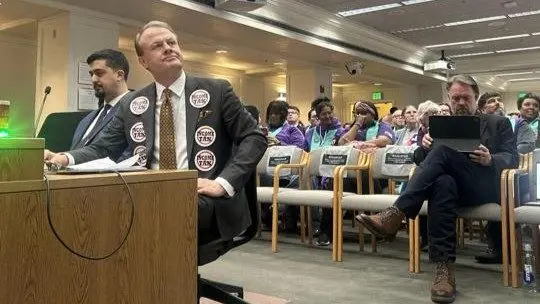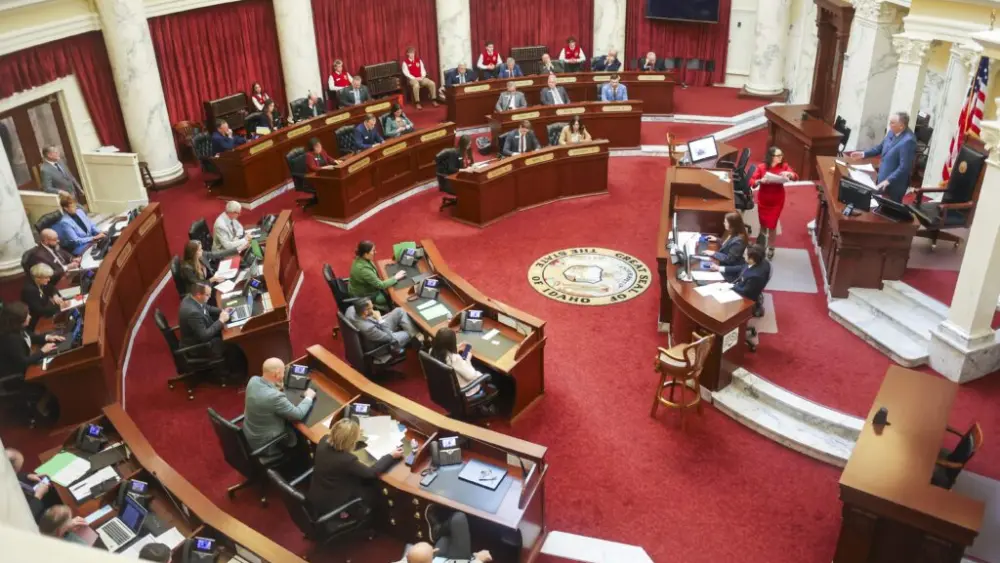GOLDENDALE, WA – The fate of a proposed 1,300-acre solar farm in south-central Washington is back in the hands of Gov. Bob Ferguson.
The Energy Facility Site Evaluation Council voted Tuesday to recommend that the governor approve the Carriger Solar project in Klickitat County. Backers say the facility will generate enough power to serve thousands of homes.
This marked the council’s second time endorsing the proposed development. Ferguson turned down its initial recommendation to proceed in August, telling the state panel to talk further with Yakama Nation leaders about their concerns that protections for cultural resources were not tough enough.
On Tuesday, the council approved a revised site certification agreement containing a new condition that the developers provide $100,000 in grant funding to the Yakama Nation Cultural Resources Program once the project is operational. The vote was 6-1 with Maverick Ryan, representing the state Department of Natural Resources, dissenting.
That revised agreement, and a six-page summary of what’s transpired with the tribe since August, will be sent to Ferguson, who will have 60 days to approve or reject the project.
Kurt Beckett, the council chair, said during the meeting that he supported the project before and did not “really see a reason to change that at this stage.”
Matt Chiles, who represents Klickitat County on the panel, cast the lone dissenting vote when the council first approved the project in June. On Tuesday, he joined the majority.
Chiles praised the council staff for going “above and beyond” in responding to the governor’s directions.
“I’m comfortable with the mitigations that are proposed,” he said.
A spokesperson for the governor did not immediately respond to a request for comment.
Cypress Creek Renewables, based in Santa Monica, California, is looking to build the solar farm north of State Route 142 along Knight Road, about two miles west of Goldendale in unincorporated Klickitat County.
“We greatly appreciate the state’s leadership on moving this important project forward,” CEO Sarah Slusser said following the decision. She called the council’s action “an important step toward meeting the state’s energy needs with clean, affordable, and reliable power.”
As proposed, Carriger Solar will have 160 megawatts of solar generating potential, enough to power up to 32,500 homes, according to the company website. The project, which also includes a 63 megawatt battery energy storage system, will tie into the Bonneville Power Administration transmission system. It is expected to be online by 2027.
It would occupy 1,326 acres within a 2,108-acre development site that is mostly agricultural and rural residential lands. That footprint includes all solar arrays, battery storage facilities, operations and maintenance building, employee parking, and access roads.
Under the agreement approved Tuesday, fencing and solar panels must be pushed farther from the state route, Knight Road and parcels managed by the state Department of Natural Resources adjacent to the project. There also must be additional natural screening, such as earthen berms, rock piles, or native vegetation, on the north side of those state-owned parcels.
Tribal access to traditional and cultural properties must be maintained during construction.
Yakama Nation leaders, who Beckett said continue to oppose the project, have repeatedly asserted measures to protect cultural resources on and around the proposed location are not strong enough.
For example, the tribe said the council should not allow installation of solar panels in the northern portion of the project area, rather than rely on setbacks and natural screening to minimize the visibility of the panels.
In Tuesday’s meeting, the council was told the project would not be viable if it were scaled back to that extent.
Joanne Snarski, a siting specialist for the council, said tribal officials reiterated their concerns in a Sept. 25 letter.
Separately, 12 public comments were submitted concerning the revised site certification agreement. “No comments provided new information or justified changes to the draft resolution,” she told the council.
When Ferguson first turned down the project, he made clear in his Aug. 22 letter that he viewed it as “consistent with state policies.” He also said it needed to proceed quickly so developers could secure federal clean energy tax credits before they are ended by the Trump administration. Solar and wind projects must begin construction by July 4, 2026 to fully qualify for the credits, he wrote.
“These tax credits are critical to ensure not only that the project remains financially viable, but that the energy it generates will remain affordable for Washingtonians,” he wrote.
Slusser said she did not have a timeline for when construction would begin, if the project is approved. “We are moving with urgency to break ground to ensure we can secure federal tax credits,” she said.
This story first appeared on Washington State Standard.





